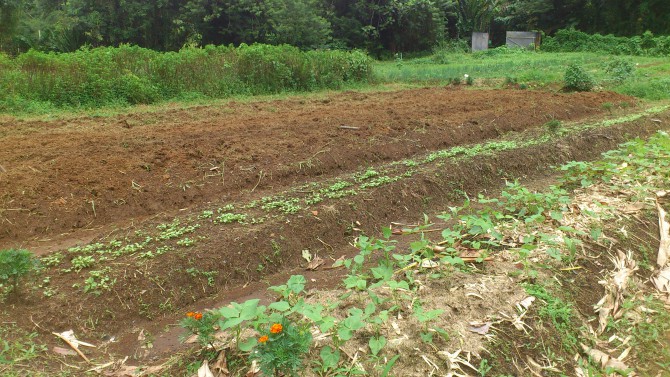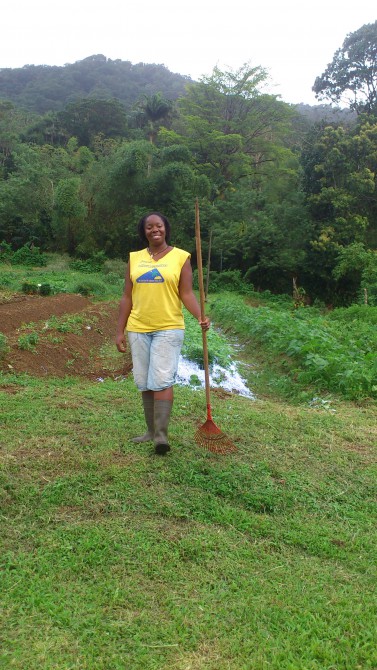7 things I didn’t know about WOOFing in Martinique (plus 2 things I did)
By Abena Clarke
Afropean’s Abena Clarke has relocated to Martinique from South London to seek the finer things in life. Normally a teacher by trade, Abena shares her experience of moonlighting as a WOOFer on this Caribbean isle.
Like any armchair lefty, I have long harboured the secret desire to go WOOFing. WOOFing is proper proof of commitment to social change; it’s stuff white people like #132 for heaven’s sake! Actually, I didn’t know that ‘til I started writing this. And I’m not white, although I do have a history degree. But when you work in the UK charity sector long enough, you know how it goes and so a quick Google confirmed my suspicions. So, should I one day decide to try and get another job in the sector once this adventure has come to a close, I will be able to explain a competency via my WOOFing experience.
Oh, you don’t know what WOOFing is? Please excuse my presumptuousness. For those not in the know, Working On an Organic Farm is exactly that. Sort of. It’s voluntary, unpaid work, often in exchange for food and lodging, and for the London-based, usually takes place abroad, possibly combined with some extended travel. And it comes with serious leftie cred. Some people do it during their annual leave for a couple of weeks, others take extended leave, or do a ‘later in life’ gap year. It’s kind of like it says on the tin, you go and work on a farm for a couple of weeks/months/years and come back ready to make some money off your garden at the farmers’ market. Or just able to grow your own veg depending on how deep that commitment to social change goes.
Located on a tropical volcanic island in the Caribbean, with a summer holiday ahead of me and a whole lot of travelling just behind me, I thought this could be a wise way to spend a bit of time. And no money. I might just learn something useful while I’m at it. After week one of my part-time WOOFing (I want to have other adventures too!) I have isolated but two cons to seven pros of this summer plan:
PROS
1) Routine. During the summer, with nothing to do, and friends with regular 9-5s, it’s tempting to spend all day lounging and reading on the beach, or wandering around town, eating out, or planning and having adventures. Or worse, hanging out at home all day, every day. These are not bad things in and of themselves, but I know me. Not being productive equals quickly getting bored, and then miserable.
Also, being rather lazy by nature, all of this (except chilling chez moi) requires some effort/cost: the walk home from the beach is 15 minutes up a steep hill, town would no doubt involve seeing gorgeous must-buy bits and bobs, and adventures take effort to plan, and money (which I’m currently trying to save) to execute. With a twice a week commitment to helping out a young local organic farm trying to make its way in the world, I have secured two days out of five where my idle hands will not run into trouble.
2) Time in the countryside. It was something of a disappointment upon arrival to discover that St Pierre, Martinique’s most gorgeous-if-abandoned historic town, would not be a sensible location for a non-driver’s licence holding person to live if their place of employment was Schoelcher. As much as this relatively hip university town has grown on me, I still yearn for the tranquility of the countryside. When I left London, it wasn’t for the hustle and traffic of another town after all. The farm I work on is set in a location that can only fairly be described as breathtakingly beautiful. All that can be heard is the water streaming along in the river behind the land, the birds singing, and all I can see is green in all shapes and sizes, the river that pretty much encircles the land, and mountain. It’s truly a sight to behold and when there I like nothing more to take in my surroundings and just be.
3) Guaranteed intelligent company. I didn’t know I’d get this when I offered to come and lend a hand. I’d met the head farmer chap when accompanying a field trip to his land, and knew he was warm, friendly, and articulate, that he had a scientific background and a Masters (all the students looked amazed; a Masters? And he runs a farm?); but that was pretty much it. The discussions we’ve had so far on land ownership, slavery and agriculture in the Caribbean, in fact, everything we’ve talked about has been delightfully and surprisingly engaging, stimulating and thought-provoking for me. Not to mention pleasant and filled with laughter. Much better than the same conversation with ‘admirers’ on the beach.
4) Free exercise!! Without my daily 30 minute hike to and from work to keep me slender(!), I was in dire need of a new exercise routine. Turns out farming is like, graft. While I tried to conjure the spirit of my cane-cutting great-great-grandmother to get the technique right when swinging a cutlass, there was no denying that just trying to walk through the fields in wellington boots was a workout. Getting home at 8.30pm knackered is also of course fabulous for my sometimes erratic sleep which, in turn is also good for the old metabolism. This is particularly appreciated given the quantity of number 5:
5) Free food! Either these guys like me, or making a loss, but they insist of feeding me at least one meal a day when I’m only there for a couple of hours in the afternoon. Plus while we work we may well pick fruit and eat it, and then they send me home with a basket full of fruit, veg and herbs. And the food they make is simply scrumptious; the best food – homemade or restaurant-prepared – I’ve eaten since I’ve arrived. Easily.
6) Learning how to grow food. Something I’ve long wanted to do but with the hustle and bustle of life just never got round to when I was in London. So far I’ve weeded, planted, picked and replotted fruit and veg from limes to papaya to pumpkins. Learned about and tasted loads of new ones, seen varieties and rarities I’d never see in the market, and discovered the world of farming and organic farming in the French Caribbean in general. And it’s only week one!
7) Improving my French. As I teach English, and seem to attract people with a good level of English socially, it’s been rather refreshing to spend hours with people who communicate with me only in French. My life is kind of bilingual but my farming crew are French and Creole only folk. They speak a little English, but they read and understand a lot more, so I spend hours chatting in French with no English shortcuts, or listening to native French speakers converse / also conversing. Not for the faint-hearted. The older ones are good about correcting my French too: totally unexpected bonus.
WOOFing is definitely a good use of my time. Plus according to Malcolm X, I can now talk about revolution as – assuming I can procure seeds – I won’t have to eat grass.
CONS
1) Pneumonia. When it rains we keep working. We might get soaked through but we dry off pretty quickly. This is the tropics after all. With waterproofs you get too hot to work so I’ve been reassured there’s no point. And there’s a plant we chew or make tea with daily, which staves off colds (and pneumonia). My farming crew swear by it. It’s only week one. I hope this plant doesn’t favour locals and also works on foreigners.
2) Hot farmers. Now if you grew up in a metropolis like me, and had little contact with folk who grew food for a living, you may be like me prior to my WOOFing experience. Unaware that farmers were not all missing teeth, illiteracy, bigotry and dungarees. And funny accents. This is what TV does to you…Nope, my farmers are gifted political and social commentators, entrepreneurs, passionate about the environment, and they have six packs. As in, not over-developed-at-the-gym six packs, but I-live-an-active-life six packs, making them somehow more authentic six packs. They are also otherwise easy on the eye. Now you may be wondering why this is a con. Simple really: ‘cos trying not to peek at your married co-worker’s chest is distracting. Especially when you don’t believe in the objectification of human beings. And if I’m going to be overly distracted, I might as well be wandering around town people-watching, not WOOFing.
I must say, I never imagined that WOOFing would be such a pleasurable experience; great food, great conversation and an end of the day dip in the ever-present river with my colleagues make the graft, which I like to think of as exercise, worth it. And totally unexpected: I was just looking for an activity to keep away from the shops so I could still eat at the end of the month! But if all goes well, I should one day be able to cook an amazing meal from the organic veg in my garden. Then I’ll be truly living the dream.
Abena Clarke is a Caribbean-based London-born teacher, writer, historian and armchair activist. She currently lives in the French Caribbean and muses on identity, belonging and backpacking on her blog movingblack. https://movingblack.wordpress.com





Love this! I studied French in Martinique a few years ago. I’ve been wanting to practice my French and WOOF. I’ve been considering France, but I was curious about opportunities in Martinique, googled it, and found you. So thanks!